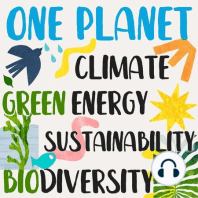20 min listen

Nick Bostrom - Philosopher, Founding Director, Future of Humanity Institute, Oxford
Nick Bostrom - Philosopher, Founding Director, Future of Humanity Institute, Oxford
ratings:
Length:
42 minutes
Released:
Sep 6, 2022
Format:
Podcast episode
Description
Nick Bostrom is a Swedish-born philosopher with a background in theoretical physics, computational neuroscience, logic, and artificial intelligence, as well as philosophy. He is the most-cited professional philosopher in the world under the age of 50.He is a Professor at Oxford University, where he heads the Future of Humanity Institute as its founding director. He is the author of some 200 publications, including Anthropic Bias, Global Catastrophic Risks, Human Enhancement, and Superintelligence: Paths, Dangers, Strategies, a New York Times bestseller which helped spark a global conversation about the future of AI. He has also published a series of influential papers, including ones that introduced the simulation argument and the concept of existential risk.Bostrom’s academic work has been translated into more than 30 languages. He is a repeat main TED speaker and has been on Foreign Policy’s Top 100 Global Thinkers list twice and was included in Prospect’s World Thinkers list, the youngest person in the top 15. As a graduate student he dabbled in stand-up comedy on the London circuit, but he has since reconnected with the heavy gloom of his Swedish roots."On the one hand, if AI actually worked out in the ideal way, then it could be an extremely powerful tool for developing solutions to climate change and many other environmental problems that we have, for example, in developing more efficient clean energy technologies. There are efforts on the way now to try to get fusion reactors to work using AI tools, to sort of guide the containment of the plasma. Recent work with AlphaFold by DeepMind, which is a subsidiary of Alphabet, they're working on developing AI tools that can be used for molecular modeling, and you could imagine various uses of that for developing better solar panels or other kinds of remedial technologies to clean up or reduce pollution. So certainly the potential from AI to the environment are manyfold and will increase over time."https://nickbostrom.comhttps://www.fhi.ox.ac.ukwww.creativeprocess.infowww.oneplanetpodcast.org
Released:
Sep 6, 2022
Format:
Podcast episode
Titles in the series (100)
(Highlights) Candace Fujikane · Author of "Mapping Abundance for a Planetary Future”: Interviewed by Mia Funk & Jacob Preisler · Associate Podcast Producer Jacob Preisler by One Planet Podcast · Climate Change, Politics, Sustainability, Environmental Solutions, Renewable Energy, Activism, Biodiversity, Carbon Footprint, Wildlife, Regenerative Agriculture, Circular Economy, Extinction, Net-Zero